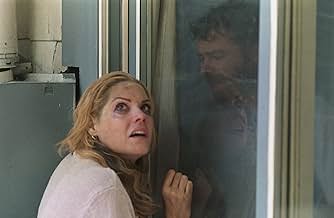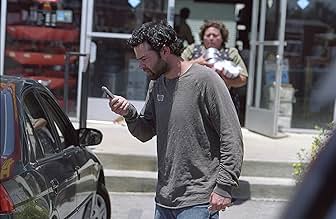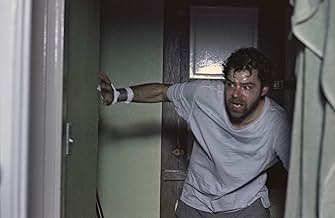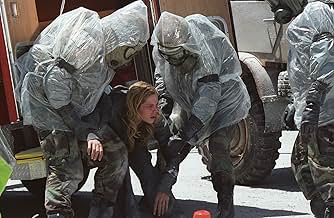IMDb रेटिंग
6.0/10
15 हज़ार
आपकी रेटिंग
अपनी भाषा में प्लॉट जोड़ेंA dirty bomb goes off in Los Angeles, jamming freeways and spreading a toxic cloud.A dirty bomb goes off in Los Angeles, jamming freeways and spreading a toxic cloud.A dirty bomb goes off in Los Angeles, jamming freeways and spreading a toxic cloud.
- पुरस्कार
- 1 जीत और कुल 2 नामांकन
Emeka Nnadi
- Synthetic Solder #2
- (as Emeka)
Christopher Rocha
- Hurried Man
- (as Chris Rocha)
फ़ीचर्ड समीक्षाएं
I had a chance to catch this at SUNDANCE.
It was probably the best movie I saw at the festival, though I only saw a handful of other films.
It's a solid debut by Chris Gorak and not a waste of 90 minutes. The setup is very good, as is the pacing and cinematography. They made the most out of what little money they had.
I have to say that at times it bordered on horrifying, and could've been classified as a horror film if some of those moments continued. Since I've lived in Los Angeles for about five years, I was particularly affected by the scenario. It's a very real possibility LA could be hit with a dirty bomb, and the repercussions would probably be similar to what's in the film.
It does suffer from some holes and stretches in logic and performance, but most thrillers do, so that's not necessarily a slam.
I can't say I liked the ending, but I was gripped by the story and the way it was shot.
A solid thriller.
It was probably the best movie I saw at the festival, though I only saw a handful of other films.
It's a solid debut by Chris Gorak and not a waste of 90 minutes. The setup is very good, as is the pacing and cinematography. They made the most out of what little money they had.
I have to say that at times it bordered on horrifying, and could've been classified as a horror film if some of those moments continued. Since I've lived in Los Angeles for about five years, I was particularly affected by the scenario. It's a very real possibility LA could be hit with a dirty bomb, and the repercussions would probably be similar to what's in the film.
It does suffer from some holes and stretches in logic and performance, but most thrillers do, so that's not necessarily a slam.
I can't say I liked the ending, but I was gripped by the story and the way it was shot.
A solid thriller.
The film opens with an unemployed musician, played by Rory Cochrane who was great in A Scanner Darkly but can't seem to flesh out his hero here past a certain point, showing a tender servile nature by making a cup of latté for his wife Lexi, played by Mary McCormack, who is still in bed. She soon leaves for work and Cochrane is at home alone. Time passes and over the radio he hears that numerous alleged dirty bombs have been set off across downtown Los Angeles. He sees significant quantities of smoke mounting from the city center. His instantaneous judgment is for his wife and her wellbeing so he drives in the direction of the city center to find her.
While it is a small-budgeted dramatic film more than anything it may seem to have pretensions about being, Right at Your Door shows several real matters Homeland Security planners are under immense pressure to handle like the interference with telecommunication because of so many calls, or the worried well who assemble to hospitals and emergency shelters and overpower emergency services, a great deal about the threat of contaminated people coming into hospitals and the necessity for facilities in which to work on decontamination. There are troubles through risk communication to the general public, the dilemma of enforcing containment after a biological attack, and the potential benefit of the Postal Service to circulate medications. It is resourceful to weave these predicaments into a dramatic narrative, a fundamentally theatrical one at that, one that is dialogue-driven more than anything.
However this standard LA-based twist-dependent thriller also uses many erroneous facets like, frankly, the use of the term "dirty bomb," or a biological agent used as an additive in a bomb, and Homeland Security recommending for people to seal a single room sooner than the entire home. Even though this paranoid thriller maintains as a vital element to the story that a virus can develop and become more lethal just by being confined, a virus needs the infection of a living thing to reproduce.
Right At Your Door taps into the present feeling of apprehension brought about by worldwide terrorism, with a fable of an attack on downtown LA that causes a haze of toxic dust overcoming adjacent suburbs, where many people generally feel the safest. Concentrating on a married couple mired in the catastrophe, Chris Gorak's script aims to squeeze frantic drama from a somewhat clever and unquestionably thorny circumstance which perceives Cochrane securely sealed inside his house as instructed by people in charge, when his infected and now possibly lethal wife McCormack arrives insisting to be allowed to enter. Such a strong dramatic conflict needs dialogue, acting, and plotting that are just as strong all the time to make it.
Alas, as the exactly ninety-minute-long film advances and the conflict grows determined upon the catch-22 challenging the fate of the two petrified leads, an excess of humdrum scenes of inert dialogue and some especially half-baked moments that put a strain on suspension of disbelief in the end lead the movie to fail to sustain its tautness.
While it is a small-budgeted dramatic film more than anything it may seem to have pretensions about being, Right at Your Door shows several real matters Homeland Security planners are under immense pressure to handle like the interference with telecommunication because of so many calls, or the worried well who assemble to hospitals and emergency shelters and overpower emergency services, a great deal about the threat of contaminated people coming into hospitals and the necessity for facilities in which to work on decontamination. There are troubles through risk communication to the general public, the dilemma of enforcing containment after a biological attack, and the potential benefit of the Postal Service to circulate medications. It is resourceful to weave these predicaments into a dramatic narrative, a fundamentally theatrical one at that, one that is dialogue-driven more than anything.
However this standard LA-based twist-dependent thriller also uses many erroneous facets like, frankly, the use of the term "dirty bomb," or a biological agent used as an additive in a bomb, and Homeland Security recommending for people to seal a single room sooner than the entire home. Even though this paranoid thriller maintains as a vital element to the story that a virus can develop and become more lethal just by being confined, a virus needs the infection of a living thing to reproduce.
Right At Your Door taps into the present feeling of apprehension brought about by worldwide terrorism, with a fable of an attack on downtown LA that causes a haze of toxic dust overcoming adjacent suburbs, where many people generally feel the safest. Concentrating on a married couple mired in the catastrophe, Chris Gorak's script aims to squeeze frantic drama from a somewhat clever and unquestionably thorny circumstance which perceives Cochrane securely sealed inside his house as instructed by people in charge, when his infected and now possibly lethal wife McCormack arrives insisting to be allowed to enter. Such a strong dramatic conflict needs dialogue, acting, and plotting that are just as strong all the time to make it.
Alas, as the exactly ninety-minute-long film advances and the conflict grows determined upon the catch-22 challenging the fate of the two petrified leads, an excess of humdrum scenes of inert dialogue and some especially half-baked moments that put a strain on suspension of disbelief in the end lead the movie to fail to sustain its tautness.
The 9-11 experience has given new relevancy to movies about terrorist attacks. In Right at Your Door, writer and first-time director Chris Gorak shows the impact of a sudden attack in Los Angeles. Similar to Spielberg's War of the Worlds, Gorak chooses to focus exclusively on the impact of the events on one coupleLexi, a professional woman who works downtown (Mary McCormack) and her husband Brad (Rory Cochrane), an out-of-work musician.
Right at Your Door adeptly explores the human implications of a scenario that seems all too plausible in today's world. At the onset of the attack there is fear, panic, despair, disorientation and poor judgment. However, as the reality of the situation settles in, a survival instinct emerges, a certain calculating rationality. And finally, Brad and Lexi must face the many moral conflicts that can plague us in times of limited resources, dangerous conditions and life and death decisions. Layered on all of this are further apprehensions and uncertainties that must be dissected: Who can you trust? What does the government know? Whose advice do you listen to? What do we tell our friends and family? It is these issues that make viewing Right at Your Door a powerful and troubling experience. We see a little bit of ourselves in these characters, and it is easy to wonder how we would react in the face of these tragic circumstances. This movie will come back to you in moments of quiet contemplation.
Gorak has made a very good movie, especially given his very limited budget and complete lack of directing experience (he been a production assistant on another movie, but has never directed anything before). I particularly like his decision not to provide any information about where the attacks came from. It's probably not all that realistic, as surely the media would be engage in non-stop speculation, but it served to focus the emotions on those things that really mattered to the characters.
Interesting tidbit from the Sundance Q&A: Some of the scenes of smoke rising over the skyline used actual footage from the bombing in Iraq.
Right at Your Door adeptly explores the human implications of a scenario that seems all too plausible in today's world. At the onset of the attack there is fear, panic, despair, disorientation and poor judgment. However, as the reality of the situation settles in, a survival instinct emerges, a certain calculating rationality. And finally, Brad and Lexi must face the many moral conflicts that can plague us in times of limited resources, dangerous conditions and life and death decisions. Layered on all of this are further apprehensions and uncertainties that must be dissected: Who can you trust? What does the government know? Whose advice do you listen to? What do we tell our friends and family? It is these issues that make viewing Right at Your Door a powerful and troubling experience. We see a little bit of ourselves in these characters, and it is easy to wonder how we would react in the face of these tragic circumstances. This movie will come back to you in moments of quiet contemplation.
Gorak has made a very good movie, especially given his very limited budget and complete lack of directing experience (he been a production assistant on another movie, but has never directed anything before). I particularly like his decision not to provide any information about where the attacks came from. It's probably not all that realistic, as surely the media would be engage in non-stop speculation, but it served to focus the emotions on those things that really mattered to the characters.
Interesting tidbit from the Sundance Q&A: Some of the scenes of smoke rising over the skyline used actual footage from the bombing in Iraq.
It doesn't take a big budget to make a good movie about what it would be like to be in a big city in a terror attack. Terror is after all, a personal emotion. Whatever the state of your relationship at that moment, that's where the picture freezes. You're not fully moved in, you hate your family, you had a fight... that's where things stand when the bombs go off. And if you're not blasted or burned or crushed in the initial blast, and if you're moderately resourceful, you'll find a way to survive -- for a while at least. And then you hope the 'authorities' do the right thing and come to save you. If you've thought about all of these things, you will appreciate how Chris Gorak plays it all out. This is not a movie for everyone. If you want all your questions answered, a big studio popcorn movie is probably more your style. But if you appreciate the exercise of putting yourself in the protagonist's shoes, this is a great ride.
When a series of dirty bombs are set off in Los Angeles the populace are told to stay indoors with windows and doors sealed. Brad's wife was in the area of the attacks though, so his priority is to get to her and make sure she is safe. With the authorities shutting down all the major roadways, Bard is forced to return home and start securing the house with the help of the labourer from next door, who has no way of getting to his own home. With only the radio for information, Brad waits for any news while, at the same time, an exposed Lexi tries to get back home.
This was a reasonably topical film at the time, perhaps not "hot on the heels" of 9th September 2001, but the fear of terrorist attacks on the West had not subsided five years later – and indeed it is still a button that can be pushed as we saw even as recently as 2008's US election. As a result I did want to see this but just never got round to doing so until the other week, mainly because it never showed up much on video or television for some reason. The film opens with its strongest card – the attacks, the initial panic, the initial fear and the initial moral questions. All of this is good and it does touch a nerve. The problem comes when the film has played that card and cannot get much more mileage from the emotions that many viewers will already have. This gives us a second half (or the remaining two-thirds to be honest) that doesn't work as well at all.
The plot brings characters in and out, has little things to fill the time and none of it ever convinces in the way the opening third did. It doesn't help that we don't really ever get into the characters so we don't feel a terrible lot for the people and indeed end up just questioning what they are doing and thinking – mainly because they are not real to us so we don't accept what they are doing. It heads towards a conclusion that would work well on the Twilight Zone perhaps but here it just seems like a dramatic way to finish for the sake of having a dramatic finish rather than fitting with the characters and narrative than I had just spent 90 minutes on. The cast are not the blame because they do give solid turns – particularly McCormack and Cochrane. OK the child (Noyd) is weak but in fairness so was his character.
Overall Right at Your Door opens well and the "pitch" concept is delivered upon pretty well. When it comes down to having another 60 minutes to fill after this though, it is not that good and it doesn't convince or engage as it should. A shame but as a total film it is average at best and instead of being part "realistic emotional drama" and part "Twilight Zone-esquire thriller" it would have been better shorter, simpler and filmed as a Twilight Zone episode.
This was a reasonably topical film at the time, perhaps not "hot on the heels" of 9th September 2001, but the fear of terrorist attacks on the West had not subsided five years later – and indeed it is still a button that can be pushed as we saw even as recently as 2008's US election. As a result I did want to see this but just never got round to doing so until the other week, mainly because it never showed up much on video or television for some reason. The film opens with its strongest card – the attacks, the initial panic, the initial fear and the initial moral questions. All of this is good and it does touch a nerve. The problem comes when the film has played that card and cannot get much more mileage from the emotions that many viewers will already have. This gives us a second half (or the remaining two-thirds to be honest) that doesn't work as well at all.
The plot brings characters in and out, has little things to fill the time and none of it ever convinces in the way the opening third did. It doesn't help that we don't really ever get into the characters so we don't feel a terrible lot for the people and indeed end up just questioning what they are doing and thinking – mainly because they are not real to us so we don't accept what they are doing. It heads towards a conclusion that would work well on the Twilight Zone perhaps but here it just seems like a dramatic way to finish for the sake of having a dramatic finish rather than fitting with the characters and narrative than I had just spent 90 minutes on. The cast are not the blame because they do give solid turns – particularly McCormack and Cochrane. OK the child (Noyd) is weak but in fairness so was his character.
Overall Right at Your Door opens well and the "pitch" concept is delivered upon pretty well. When it comes down to having another 60 minutes to fill after this though, it is not that good and it doesn't convince or engage as it should. A shame but as a total film it is average at best and instead of being part "realistic emotional drama" and part "Twilight Zone-esquire thriller" it would have been better shorter, simpler and filmed as a Twilight Zone episode.
क्या आपको पता है
- ट्रिवियाThe film was acquired by Lions Gate at 2006 Sundance for nearly $3 million for worldwide rights.
- क्रेज़ी क्रेडिटAs the opening credits come on-screen, they form themselves into a street-map.
- कनेक्शनFeatured in WhatCulture Originals: 12 Most Anxiety-Inducing Sci-Fi Movies EVER (2020)
- साउंडट्रैकValley
Composed and Produced by tomandandy
Performed by tomandandy with the Psychadelic Gamelan Electric Orchestra
Published by andyandtom music
टॉप पसंद
रेटिंग देने के लिए साइन-इन करें और वैयक्तिकृत सुझावों के लिए वॉचलिस्ट करें
- How long is Right at Your Door?Alexa द्वारा संचालित
विवरण
बॉक्स ऑफ़िस
- US और कनाडा में सकल
- $65,018
- US और कनाडा में पहले सप्ताह में कुल कमाई
- $32,452
- 26 अग॰ 2007
- दुनिया भर में सकल
- $21,23,040
- चलने की अवधि
- 1 घं 36 मि(96 min)
- रंग
- ध्वनि मिश्रण
- पक्ष अनुपात
- 1.85 : 1
इस पेज में योगदान दें
किसी बदलाव का सुझाव दें या अनुपलब्ध कॉन्टेंट जोड़ें







































